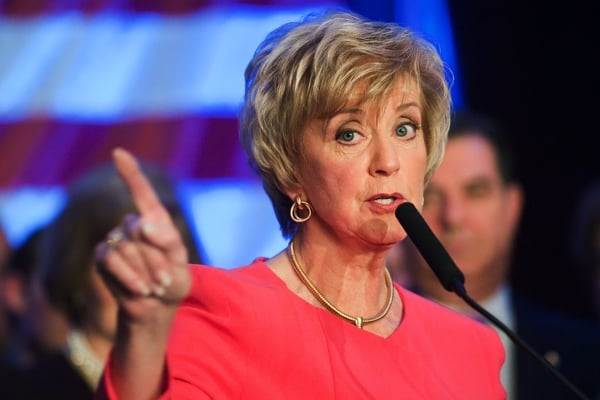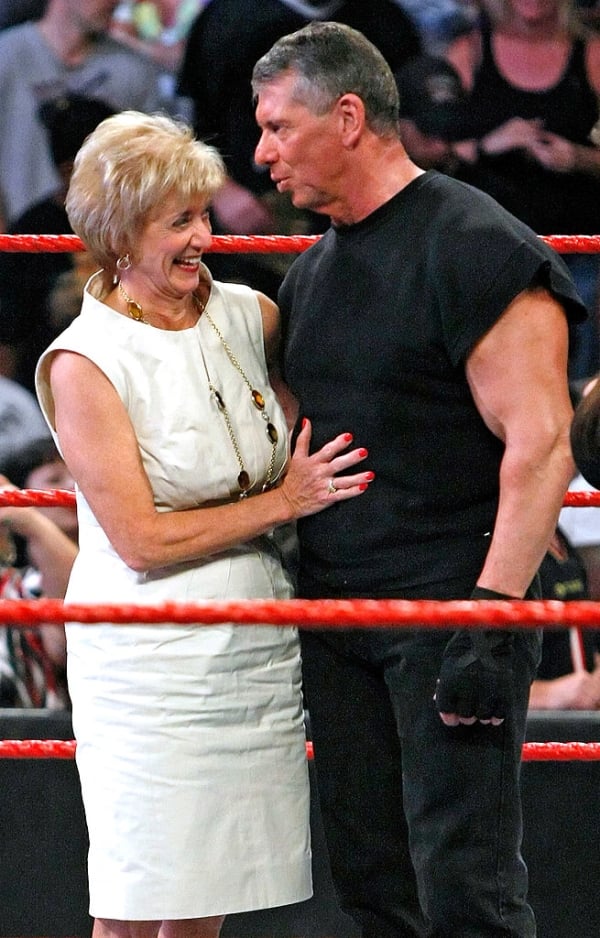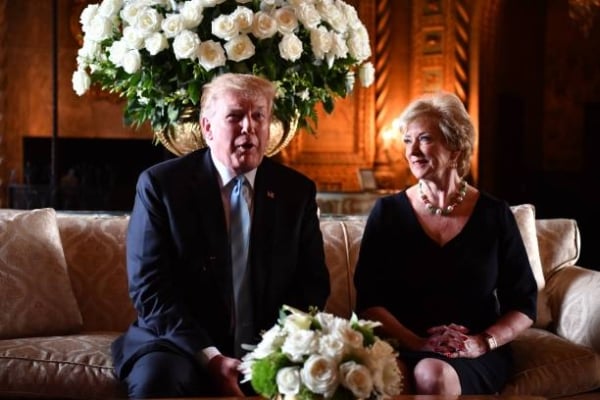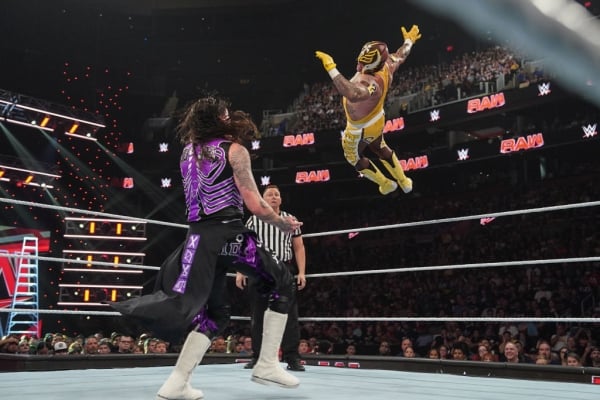
President-elect Donald Trump’s nomination of Linda McMahon as education secretary came as a surprise to many in the education world, akin to a story line swerve befitting of her former employer, WWE.
McMahon’s past in professional wrestling was quickly picked apart, with videos of her on-screen moments going viral. The prospective head of the Education Department was shown being manhandled by muscle-bound behemoths, including a wrestler who is now mayor of Knox County, Tenn. Some online commentators poked fun at the nominee and the carnival atmosphere of the WWE, while others embraced the image of McMahon as a fighter ready to bend the department to her will.
The reaction shows how polarizing Trump’s pick is and what lies ahead for McMahon as she gears up for a confirmation hearing to lead the agency that the president-elect has said he wants to eliminate. And in a world where pro wrestling has surprising overlaps with politics, the videos show her deep connection to an industry that shaped her as a leader and politician and gave her a personal connection to Trump, who appointed her to lead the Small Business Administration in his first term.
To her critics, McMahon is an unqualified pick from the melodramatic world of pro wrestling, where testosterone and scandal runs unchecked. To her supporters, she is a capable corporate executive who helped lead WWE from a burgeoning regional business when her husband, Vince McMahon, purchased it from his father in 1982 for an estimated $1 million, to a global phenomenon that monopolized and reshaped the wrestling industry, which was valued at $9.3 billion last year. To others, she is a wild card, given her limited experience in the education sphere.
In wrestling, you never apologize. Apologies equate to weakness. In wrestling, you always double down and never back off.”
—Shannon Bow O’Brien, professor at University of Texas at Austin
While it’s not yet clear how she will lead the department, those who watched her ascend from WWE to national political prominence, including two failed Senate runs in Connecticut, expect her to lead quietly, efficiently and perhaps ruthlessly, given how WWE took control of the wrestling industry through a mix of creativity and a cutthroat business approach that put numerous competitors out of business.
Building an Empire
Linda McMahon’s pathway to the wrestling world came via her husband, Vince, whom she met in church in their native North Carolina in 1961, when she was 13 and he was 16. The couple married when she finished high school; she then attended nearby East Carolina University.
Vince soon went to work for his father as a wrestling commentator and in other roles. Linda joined him after he bought the company, taking a hands-on role.
“My husband and I built our business from scratch. We started out sharing a desk. Over decades of hard work and strategic growth, we built it into a publicly traded global enterprise with more than 800 employees. I am proud of our success—I know every bit of the hard work it took to create that success,” she said at her SBA confirmation hearing in 2017. “I remember the early days when every month I had to decide whether I should continue to lease a typewriter or if I could finally afford to buy it. Yes, that $12 a month really made a difference in our budget.”
(McMahon did not respond to a request for comment from Inside Higher Ed sent through the Trump transition team.)
McMahon was a key executive from the early 1980s through 2009.
“She was the No. 2 person there,” said Dave Meltzer, editor of the Wrestling Observer Newsletter. He noted that while “she didn’t have any influence on the creative side at all,” Linda was heavily involved “on the business side,” negotiating deals and making nonwrestling decisions.
Their entry into the wrestling world prompted an immediate shake-up as the couple took the brand national at a time when the industry was split into regional territories. Vince ran shows on other companies’ turf and signed away top talent while offering a different product. He leaned into wrestling’s cartoonish elements and away from gritty realism.
WWE’s mainstream breakthrough came in 1985 with Wrestlemania I, its celebrity-filled signature event, which spawned an annual series. (Trump would later host and promote Wrestlemania in 1988 and 1989, and he appeared in the crowd as a fan in 1991 and 2004. He also had a story-line feud with Vince that culminated at Wrestlemania 23 in 2007.)
Riding high on the success driven by stars such as the steroidal Hulk Hogan, WWE launched a merchandising empire led by Linda. Hogan had his own Saturday morning cartoon, and the company deployed action figures, plush toys and all manner of merchandise to capture the attention of fans and pad company revenues. And it’s that effort that some credit in part for WWE’s corporate success.
One former staffer who worked on McMahon’s unsuccessful campaign for Senate in 2010 said he had a caricature of McMahon in mind from her time in WWE that was immediately dispelled when he met her.
“From the first meeting we had, she was just sharp as a whip. And you figured out very quickly that this company that she was running didn’t get to where it is just based on the product,” the former staffer said. “She was the chief executive, and all of the significant growth that the company has achieved was under her direction. Everything from the licensing deals, the TV deals and [merchandising] deals with Mattel—all of the things that you need to do to take a local, regional brand and turn it into a globally recognized brand, that was under her leadership.”

Linda McMahon led the Small Business Administration during President-elect Donald Trump’s first term.
Peter Casolino/New Haven Register/Getty Images
With Hulkamania running wild, the business entered a boom period that the McMahons sought to capitalize on, successfully lobbying state lawmakers to loosen regulations governing the sport. To bolster their case for fewer rules, the McMahons broke a cardinal sin in the industry: They admitted that the matches were not authentic athletic competitions but rather “sports entertainment.” That move infuriated the industry but freed them from oversight by state athletic commissions, which treated wrestling much like boxing in many places, a facet that has not entirely gone away.
The lobbying effort was the McMahons’ first foray into politics and showed a willingness to upend rigid industry norms for personal gain.
Linda McMahon became president of WWE in the 1990s, shortly before Vince was indicted by the federal government in 1994 for allegedly providing steroids to his roster. He was found not guilty by a jury, though multiple wrestlers admitted to illegally using steroids, revealing how pervasive the problem was in WWE.
While her husband was the creative force behind WWE, Linda maintained a low profile offscreen before eventually becoming a character on television as a story-line authority figure, clad in her signature pantsuit, her voice often flat and tinged with a North Carolina accent. She made sporadic appearances from the late 1990s through the late 2000s, a time period when the WWE had shifted from a cartoonish, family-friendly product to what became known as the more adult-oriented Attitude Era, a period marked by an uptick in profanity, sexual content and other mature themes.
“Linda was often cast as a dramatic foil to her husband in these scenes,” Lowery Woodall, president of the Professional Wrestling Studies Association and a communications professor at Millersville University, wrote by email. “She would prevent him from engaging in some sort of dastardly or underhanded behavior by using her corporate authority. Linda was famously uncomfortable as an on-camera figure and her storyline integration was therefore kept to a minimum.”

Then-WWE CEO Linda McMahon appears with Vince McMahon in the ring at WWE Monday Night Raw show at the Thomas & Mack Center on August 24, 2009, in Las Vegas.
Ethan Miller/Getty Images
Her most significant onscreen moment came in 2001 during Wrestlemania 17. In the story line, she was medicated as Vince openly carried on an affair with a former fitness model–turned–wrestler. In true wrestling fashion, as her son, Shane McMahon, battled his father, Linda emerged from a sedated stupor and kicked Vince in the crotch, costing him the win.
(WWE later toned down the adult themes and over-the-top violence in its programming, adopting a PG approach and TV rating in 2008 before McMahon ran for a U.S. Senate seat in Connecticut in 2010.)
Dan Collier, a lifelong wrestling fan and professor of higher and adult education at the University of Memphis, notes that McMahon has mostly operated behind the scenes, in the shadow of her bombastic husband. He expects she’ll fulfill a similar role in the Trump administration, working “quietly and efficiently” without the showmanship other picks might have brought.
“Killing the Department of Education outright is probably not going to be a thing that’s going to exist for this administration, given the makeup of Congress. However, they can hobble it. Somebody like Linda McMahon would do it quietly, and that’s what I am most concerned about,” Collier said.
Scrutinizing Her Background
Although McMahon’s appointment was a surprise, lawmakers on both sides of the aisle and higher education associations are waiting to learn more about her before casting judgment on the pick. The confirmation hearing, expected to be in January, will likely yield some answers about how she’ll approach the job and her views on higher education, though her WWE experience will likely loom large.
McMahon’s experience in education is limited but not nonexistent. She served as a trustee for Sacred Heart University for more than 15 years and on the Connecticut Board of Education for a year. She also promoted popular literacy initiatives during her time at WWE.
But experts predict that lawmakers will ask about her false claim that she earned an education degree from East Carolina University, which she asserted on a questionnaire she filled out to serve on the state board. McMahon’s degree is in French, not education, though she did earn a teaching certificate.
Woodall said he expects McMahon to be “grilled over some of the WWE’s business practices and controversies,” including the steroid trial from the 1990s, “the death of Chris Benoit and Ashley Massaro respectively, and the WWE’s efforts to quash wrestler unionization” in the 1980s, when Vince and Hogan mobilized to stop an organizing effort by future Minnesota governor Jesse “The Body” Ventura. Woodall also expects new and explosive scandals to come up.

Linda has been named, alongside her husband, in a lawsuit filed last month accusing WWE of turning a blind eye to the sexual abuse of young men, often from disadvantaged backgrounds, who worked on the crews that set up wrestling rings. The abuse is alleged to have occurred from the 1970s through the early 1990s. The McMahon family and WWE have previously denied wrongdoing and downplayed knowledge of misdeeds.
Meltzer argued Linda “had to have suspicions, because everyone did.”
Her proximity to sexual abuse allegations has concerned some Title IX advocates, who have questioned how she would protect students.
Her husband is also embroiled in a lawsuit brought by former WWE employee Janel Grant, who was in a relationship with Vince and accused him of physical and emotional abuse, as well as sexual assault. He has denied wrongdoing, and the case is currently stayed amid a Department of Justice investigation of the former WWE figurehead, reportedly for sexual misconduct. (Meltzer expects the Trump administration’s DOJ will halt the investigation.)
Linda McMahon is not on trial for the sins of her husband, whom she is separated from, though his many scandals could cast a long shadow on the confirmation hearing and her tenure at the department. Beyond the “ring boys” scandal and the Grant lawsuit, sexual assault and misconduct allegations have trailed Vince McMahon for years. In 2022 he settled with a former WWE employee who accused him of a 1986 sexual assault, and multiple other women have alleged impropriety.
Pro Wrestling, Politics and Trump
Professional wrestling often serves as a punch line for those who view the spectacle with contempt, but it is massively popular and key to understanding Trump, according to some experts.
At its core, wrestling is ultimately a performance art and a morality play.
Shannon Bow O’Brien, who teaches American politics at the University of Texas at Austin and is the author of Donald Trump and the Kayfabe Presidency: Professional Wrestling Rhetoric in the White House, argues that “at its most basic level, wrestling is about emotional appeals,” which pit “good guys versus bad guys” and create two-dimensional, “stylized caricatures of people.”

After the boom period of the late 1990s cooled off, wrestling has seen a resurgence in recent years.
As someone who studies rhetoric, O’Brien sees parallels between Trump and the wrestling world, which he fit into during his 2007 WWE run, later earning a spot in the company’s Hall of Fame.
Trump acts, in many ways, like a classic wrestling heel (a bad guy), she argues, thriving off the reactions to his actions. Attention—whether positive or negative—is most important in wrestling.
“In wrestling, you never apologize. Apologies equate to weakness. In wrestling, you always double down and never back off,” O’Brien told Inside Higher Ed by email. “Also, accepting responsibility for negative things means accountability, and he always avoids any accountability for negative things while claiming credit for all positive events. Donald Trump never apologizes and doubles down, even if it’s openly wrong, because he sees both as negative weaknesses.”
For years, wrestling fans have been in on the act and integral to the performance. Their reactions can make or break characters and story lines. And some experts see parallels between fans and voters, including David Moon, a senior lecturer in politics at the University of Bath in England, who has written about how professional wrestling explains contemporary politics.
“Enjoying pro-wrestling involves a deliberate suspension of disbelief, whereby fans both acknowledge the theatricality of the performance while investing in it emotionally. Fans collaborate with the performers themselves by playing along as ‘believing fans,’ cheering and booing as conventions dictate, embracing the spectacle even while recognising its pretence,” Moon wrote to Inside Higher Ed by email.
He also sees Trump rallies as akin to pro wrestling events, noting that both allow fans a chance to “experience and enjoy emotions normally unavailable to them—they can scream, shout and display rage in a rare public context where that sort of expression is socially permitted.”
Moon argued that Trump fully embraced the pro wrestling world in his last campaign, tapping Hogan to join him on the campaign trail and appearing on the podcasts of wrestling legend Mark Calaway, best known as The Undertaker, and current WWE performer Logan Paul.
He also pointed out that McMahon isn’t the first former WWE executive to hold a top education post. Across the pond, that honorific goes to Michelle Donelan, who worked in international marketing for WWE before she briefly became U.K. secretary of state for education in 2022. Donelan was only in the role for 36 hours before resigning.
In a sense, if Trump’s rhetorical style is ripped from the macho world of wrestling and his voters are more akin to fans, McMahon may be a natural fit for his administration. In her SBA role, she was generally viewed favorably and emerged scandal-free, unlike other appointees.
While some critics have cast McMahon as a villain hiding a “cold heart” behind a grandmotherly veneer and a threat to American education, other observers have struck a wait-and-see posture.
“Linda McMahon will bring decades of business experience. She has not been able to achieve her success without understanding the need for compromise, negotiation, and give and take in situations,” O’Brien wrote. “Education is a public good that serves all of us. One of the most important things we can do is equip our children with the tools needed for success. I think we need to listen to her visions for the Department of Education before we vilify or exalt her.”